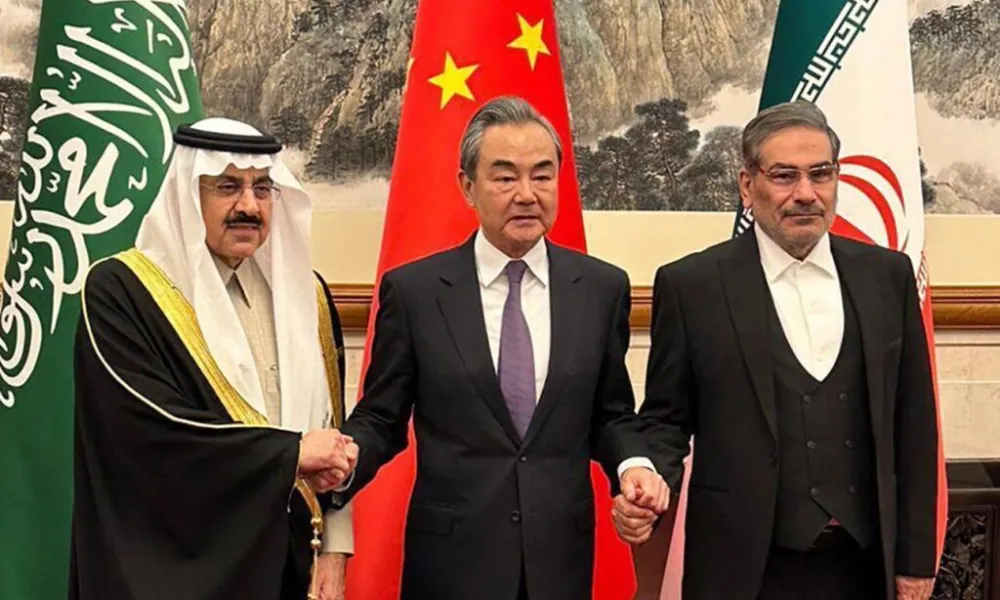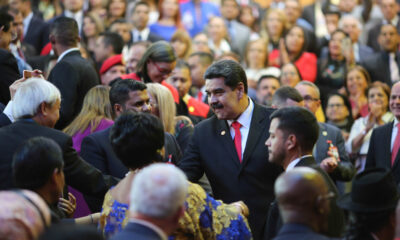News
China brokers deal between Iran, Saudi Arabia

China was instrumental in brokering a deal in which Iran and Saudi Arabia restored their diplomatic relations. The terms of the new deal include the re-opening of both embassies and missions in each other’s countries in the next two months.
“The agreement between Saudi Arabia and Iran, which China mediated, reflects a new reality in West Asia, namely, that China is now a geopolitical and economic power in the region with the ability to influence bilateral relationships and security dynamics,” Washington-based Middle East Institute’s Mohammed Soliman wrote.
Saudi Arabia severed ties with Iran after Iranian protesters attacked Saudi diplomatic missions in 2016 following the Saudi execution of revered Shiite cleric Nimr al-Nimr. This was one of several conflicts between the two nations.
Iran and Saudi Arabia took separate sides in the conflict in Yemen and have also been competing for influence in Syria, Lebanon and Iraq.
“It kind of sets the scene for the region’s two superpowers to start to hash out their differences,” said Dina Esfandiary of the International Crisis Group.
“The potential downside of that, of course, is that if they are the ones who are dividing up the region and sorting things out amongst themselves, you start to lose sight of regional contexts and grievances, which could potentially be problematic.”
The agreement was set in stone after five days of talks in Beijing, which also coincided with President Xi Jingping being re-elected to serve another term as China’s President.
“Following talks, the Islamic Republic of Iran and the Kingdom of Saudi Arabia have agreed to resume diplomatic relations and reopen embassies and missions within two months,” said the joint statement, which was published by both countries’ official media.
Iran’s Foreign Minister Hossein Amir-Abdollahian welcomed the new relations with Saudi Arabia and promised that Tehran will “actively prepare other regional initiatives”.
“The return to normal relations between Tehran and Riyadh offers great opportunities to the two countries, the region and the Muslim world,” he tweeted.
Saudi Arabia’s top diplomat Prince Faisal bin Farhan Al Saud said the agreement illustrates Saudi Arabia’s desire for “political solutions and dialogue” which they want to become more common in the region.
France said they were delighted to have more dialogue, but also pleaded with Iran to “renounce its destabilizing actions”.
UN chief Antonio Guterres praised the deal and said he was ready to “use his good offices to further advance regional dialogue”.
“Good neighborly relations between Iran and Saudi Arabia are essential for the stability of the Gulf region,” his spokesman said.
The U.S. also welcomed ‘any efforts to help end the war in Yemen and de-escalate tensions in the Middle East region,’ White House press secretary Karine Jean-Pierre said.
“Generally speaking, we welcome any efforts to help end the war in Yemen and de-escalate tensions in the Middle East region. De-escalation and diplomacy together with deterrence are key pillars of the policy President Biden outlined during his visit to the region last year,” White House National Security Council Spokesperson John Kirby said.
The White House did say they are skeptical about whether Iran will “meet their obligations”.
Terry A. Hurlbut has been a student of politics, philosophy, and science for more than 35 years. He is a graduate of Yale College and has served as a physician-level laboratory administrator in a 250-bed community hospital. He also is a serious student of the Bible, is conversant in its two primary original languages, and has followed the creation-science movement closely since 1993.
-

 Civilization4 days ago
Civilization4 days agoMaduro’s Capture: U.S. Foreign Policy in Latin America
-

 Civilization5 days ago
Civilization5 days agoTrump Lashes Out at Supreme Court as Under ‘Foreign Influence’
-

 Civilization5 days ago
Civilization5 days agoTrump Administration Led With the Wrong Agency in Minnesota
-

 Guest Columns4 days ago
Guest Columns4 days agoA Bipartisan Fix for the Prescription Drug Market
-

 Guest Columns3 days ago
Guest Columns3 days agoWaste of the Day: Thousands of Earmarks in Illinois State Budget
-

 Education2 days ago
Education2 days agoIgnoring the Science: The Curious Case of Cell Phone Bans
-

 Civilization2 days ago
Civilization2 days agoA Better U.S. Strategy for Greenland Than Annexation
-

 Education3 days ago
Education3 days agoA Solid Core Enlivens Free Speech and Viewpoint Diversity


